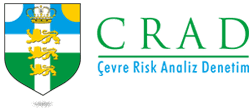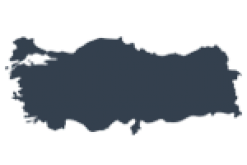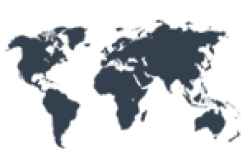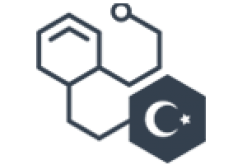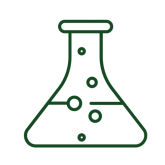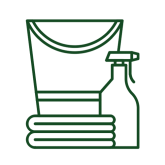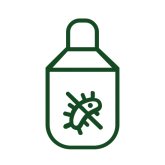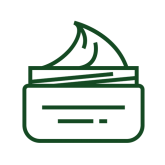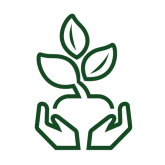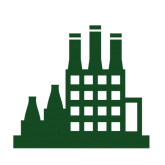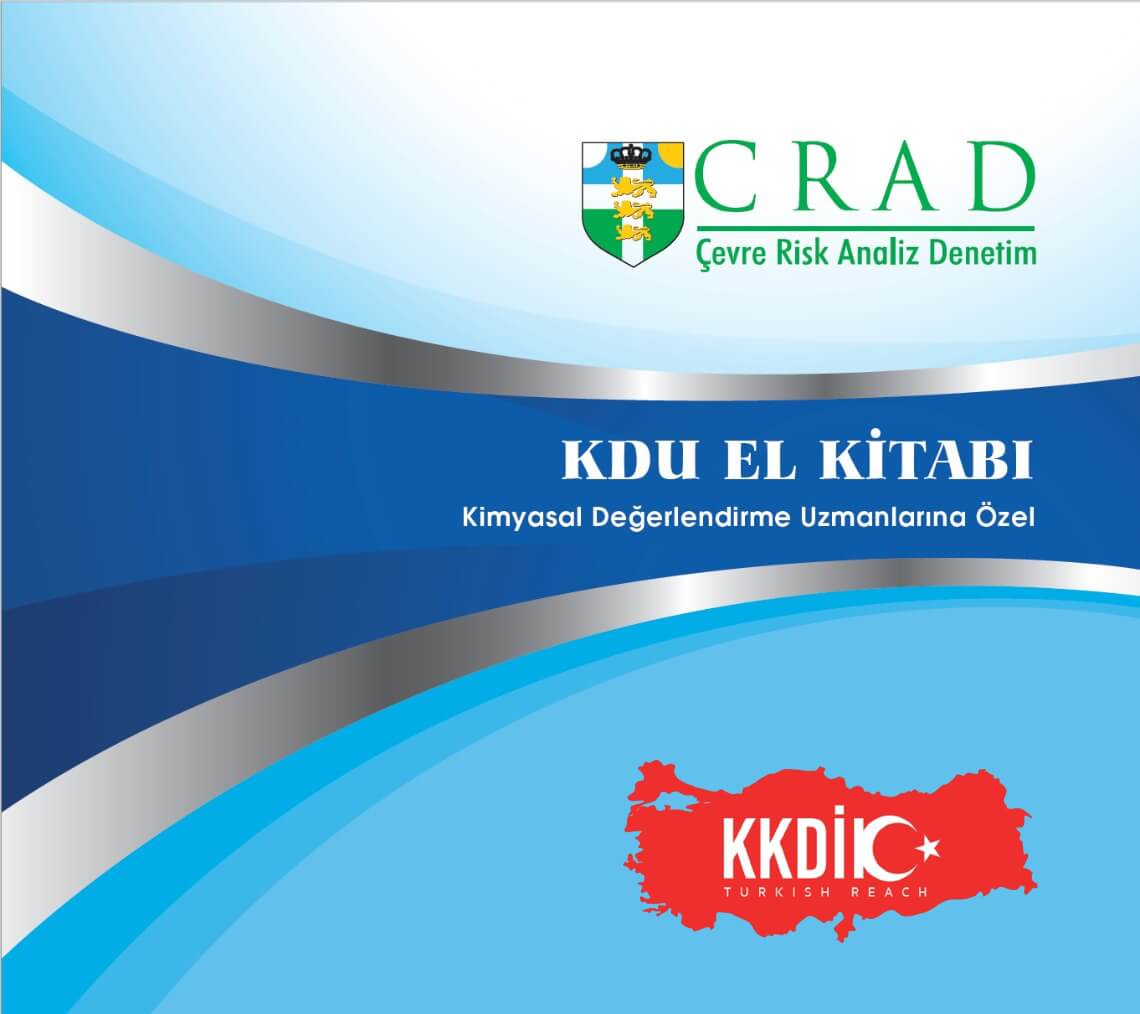KKDİK REGULATION AND CHEMICAL SAFETY ASSESSMENT SPECIALIST
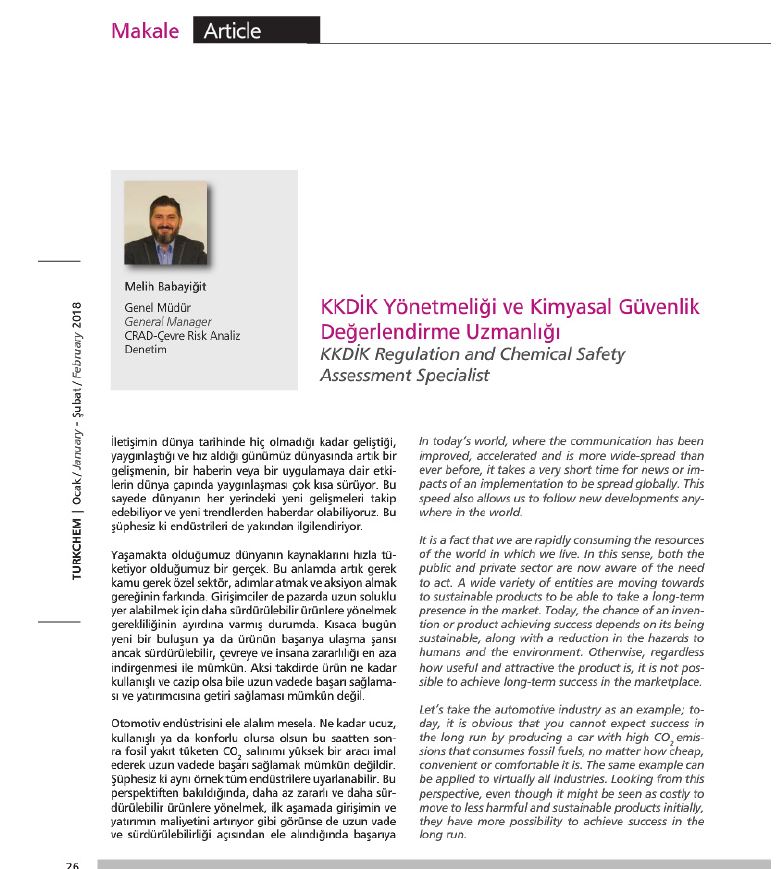 Turkchem Magazine - 2018 January-February
Turkchem Magazine - 2018 January-February
KKDİK REGULATION AND CHEMICAL SAFETY ASSESSMENT SPECIALIST
In today’s world, where the communication has been improved, accelerated and is more wide-spread than ever before, it takes a very short time for news or impacts of an implementation to be spread globally. This speed also allows us to follow new developments anywhere in the world.
It is a fact that we are rapidly consuming the resources of the world in which we live. In this sense, both the public and private sector are now aware of the need to act. A wide variety of entities are moving towards to sustainable products to be able to take a long-term presence in the market. Today, the chance of an invention or product achieving success depends on its being sustainable, along with a reduction in the hazards to humans and the environment. Otherwise, regardless how useful and attractive the product is, it is not possible to achieve long-term success in the marketplace.
Let's take the automotive industry as an example; today, it is obvious that you cannot expect success in the long run by producing a car with high CO2 emissions that consumes fossil fuels, no matter how cheap, convenient or comfortable it is. The same example can be applied to virtually all industries. Looking from this perspective, even though it might be seen as costly to move to less harmful and sustainable products initially, they have more possibility to achieve success in the long run.
When we examine the chemical industry, we see that it had been an industry always been on target in mean of sustainability and hazard, especially after the Industrial Revolution. It should not be forgotten, however, that without the chemical industry it is not possible to achieve prosperity for people and the environment in today's world. From plant protection products to disinfectants, from the pharmaceutical industry to food industry, chemical products are serving us everywhere. What we need to do, then, is to use the chemicals consciously, and to implement measures to eliminate their risks.
Also, to gain economic success, it is necessary to focus on sustainable products whose risks can be eliminated and managed.
There are a number of legislative developments for the identification of hazards and management of risks, starting from 1980 and accelerating in the early 2000s by the Governmental bodies and other organizations such as the United Nations (UN), the European Union (EU), and countries such as Japan and the United States. If we take these developments under two key headings, one of them would be the “Communication of Hazards” and the other would be the “Compilation of Scientific Data About the Chemicals”.
Hazard Communication
In brief, the Globally Harmonized System of Classification and Labelling (GHS) has been established by the UN for the communication of hazards and the measures that should be taken by the users of chemical to mitigate these hazards. In Turkey, we have been among the countries that implemented GHS via the publication of ‘’Maddelerin ve Karışımların Sınıflandırılması, Etiketlenmesi ve Ambalajlanması Hakkında Yönetmelik’’ (SEA) on December 11, 2013 which has brought the Turkish industry to the level of developed industrial countries in terms of legislation and competition. Compliance with SEA classification and labelling, which is in alignment with GHS, has been obligatory for substances as of June 1, 2015 and June 1, 2016 for mixtures. Of course, this transition brought challenges, fiscal burdens and workload for industry. However, after this burden and challenges were overcome, like the post-activity pain of an exercise, the industry improved its capacity on hazard communication and enhanced its competitiveness both in domestic and foreign markets.
Regulation on Registration, Evaluation, Authorisation and Restriction of Chemicals
Another legislative development related to the chemical industry is the regulation that requires the compilation of the scientific data on chemical substances, to be used for the purpose of risk assessment, and the identification and implementation of the risk management measures. In other words, instead of blaming the chemicals as suspected inherently negative actors, it aims to compile scientific data about the chemicals and, by way of assessment of the compiled data, to identify how these risks can be eliminated. For the substances where the risks are uncontrollable, implementation of a limitation or ban may be considered
Now let's have a look to the potential benefits that these regulations will provide to us using some examples from daily life. Cars are vehicles that we can’t live without. Thanks to technological developments and high-quality roads, we can reach to a destination faster and in greater comfort. On the other hand, however, cars become more dangerous as they accelerate. To manage this, the automotive industry is implementing new technologies day by day. The airbag, active safety belt systems and many other equipment secures us to stay safe despite the increasing speed of the cars. These types of equipment, which were a luxury option in the 1970s and 1980s, have now become standard for modern cars and a must to place a car on the market. The case and logic for the regulations are the same.
As we cannot give up using chemicals, the best and most logical way to manage them would be to compile the data about them first (REGISTRATION), to identify the hazards and risks (EVALUATION) and take relevant measures, if any, to control and eliminate these hazards and risks. If the risk of hazard cannot be managed in some circumstances (uses) despite every measure taken we than must control (AUTHORISATION) or prohibit its use (RESTRICTION) for some uses and/or conditions.
Legislative studies in developed countries have been carried out since 1960s, and improvements were adapted to make this type of system more functional since then. Finally, the EU’s Registration, Evaluation, Authorisation and Restriction of Chemicals (REACH) legislation has been the recent most comprehensive step in this regard, creating a global impact. Similar legislation has been introduced in many other countries under the concept of ''REACH like regulations''. The United States, Canada, China, Malaysia, South Korea, Thailand, Taiwan, Japan and Russia are countries publishing such regulations to control chemicals with the same perspective.
By publication of ‘’Kimyasalların Kaydı, Değerlendirilmesi, İzni ve Kısıtlanması Hakkında Taslak Yönetmelik” (KKDİK) Regulation in the Official Gazette by the Ministry of Environment and Urbanization on June 23, 2017 the legal requirements with respect to this issue has been set forth in Turkey. The regulation, will likely bring a new burden and challenge for the industry, but it also should be considered what it will teach to industry, and that it will cause an enhancing development to increase capacity and competitiveness.
Let’s make a comparison between if KKDIK had not been implemented and the cons of its implementation. First, as an authority, if you are going to impose restrictions on some chemicals, you need to put forward the reasons for this, as our country is a state of law and a member of the World Trade Organization. If there is no data to be evaluated in your hand, how can you legally restrict some chemicals from being placed on the market in a country? So, we need scientific evidence, which is called as Registration Dossier under the scope of KKDİK, to prevent our country from becoming a market where chemicals restricted in other countries can be sold to. Based on this compiled data, we will be able to make an assessment about the hazards and uses of chemicals and determine which chemical should be subject to restrictions or which of the uses should be subject to Authorisation.
Which consumer or supplier would trust a product that is produced in a legislative environment where the chemicals are not subject to any evaluation, restriction based on scientific data? Therefore, the implementation of the legislation will ensure products of Turkish origin to continue their good reputation and remain the market sustainability.
Working on a chemical product with in the Research and Development (R&D) activities should lead the industry to assess the hazard and risk of the product at the first instance, so that you can prevent losing time & money for invention of a substance which may be restricted in a short term due to its risks not being controlled.
Chemical Assessment Specialist under the scope of KKDİK
One of the new concepts and obligations that KKDİK Regulation brought to industry is the requirement for a Chemical Assessment Specialist. One of the critical nuances of KKDİK, compared to EU REACH Regulation, is Annex 18 of KKDİK which gives details about the training requirements and examination of these experts.
In my opinion Turkish legislation is being formed with some experience from the past; Namely, the first comprehensive regulation on the management of industrial chemicals - the "Regulation on the Control of Hazardous Chemical Substances and Products", which was published in the Official Gazette dated July 11, 1993 No. 21634. That was the first regulation establishing the principles and procedures for the compilation and distribution of Safety Data Sheets (SDS). Afterwards, for the purposes of implementing the provisions of this Regulation a communique titled “Procedures and Principles Regarding The Compilation of Safety Data Sheets” was published in the Official Gazette on March 11, 2002 No. 21634. Even though Article 5 of this communique states ''Safety Data Sheets must be compiled by appropriately trained professionals, including refreshing trainings '', the Authority was not satisfied with the number of adequately trained personnel in this field, and decided to implement an examination scheme for these professionals.
Following these, the Regulation published in 2008 with No 27092 titled “Regulation on the Compilation and distribution of Safety Data Sheets for Hazardous Substances and Preparations” imposed the requirement of an exam, with a certificate granted to upon successful completion. Although Regulation 27092 did not require obligatory training, candidates participated to the trainings to ensure their success on the exam, which led to a significant increase in the number of people trained in this area and the level of information obtained.
I assume all industry members would appreciate the gaining of the industry because of these trainings and exams in the mean quality of the regulatory support that they could have. Before the examination and certification scheme, number of persons who shall compile the SDSs and labels of the products especially for the export products were insufficient to meet the demand of the industry. Even though the implementation of the scheme brought a burden to the industry initially, today we see the positive results of it in the SDS and labels on the market as well as the SDS and labels of the imported raw materials to be in Turkish with appropriate terminology and language. As per the saying ‘’the pain that doesn’t kill you, empowers you’’ such new obligations lead to improve the image of the products and position in the global market.
A similar scheme is now put forward with the name of '' Chemical Assessment Specialist'' under the KKDIK Regulation. Capacity and personnel increase aimed by the Authority in this sense will be challenging for the industry in the beginning, but in near future it will lead us to conduct the Chemical Safety Assessment of our products by these specialists, which are to be marketed both domestically and globally. This is expected to increase the confidence of the consumer or users. Otherwise, as a country that does not have the capacity to conduct Chemical Safety Assessment on its products, we may face the possibility of closing doors to the markets of other countries who dictates their assessment.
In accordance with the provisions of the KKDİK Regulation, specifically Annex 18, Chemical Assessment Specialists who first must attend a total of 64 hours of training are required to sit to the examinations of the institutions that are accredited by TÜRKAK as per the (TS EN) ISO / IEC 17024 standard. They will be eligible to receive a Certificate of Proficiency by passing the exam with a grade of 70 or more. From this point of view, both these trainings, as well as the exam and the certificate to be granted, will ensure that the industry will reach the competence capacity and knowledge which is accessible locally and to comply with the chemical control legislation worldwide.
As many of the provisions of the Regulation came into force on December 23, 2017, the Ministry will start to approve the training institutions and training programs, which will be followed by the examining and certification bodies to submit their programs to the approval of the Ministry and they must apply to TURKAK for accreditation after this approval.
